In the West, the disintegration, or even a crisis, of democracy has been discussed for years. Turnout percentages and party memberships have steadily decreased. However, awareness of the crisis in discussions has not led to activities to reinforce democracy. Not even the financial crisis or the rise of populism have brought reforms. The game only changed in 2016.
The United Kingdom’s decision to leave the EU, the subversive election struggle in the United States and Donald Trump’s presidency, which defied all familiar political models, have encapsulated many of the problems with democracy that must be solved promptly. In order for democracy to work, it must be reinforced, new methods of operation must be found and there must be greater inclusion.
In egalitarian and affluent societies, there is greater democracy and inclusion.
A discussion on the future of democracy is always strongly linked to a consideration of the future of the whole of society, since democracy is linked to many aspects. General welfare, equality, confidence, education, social capital, the function of institutions, employment and the economy are essential for the realisation of democracy and inclusion. In egalitarian and affluent societies, there is greater democracy and inclusion.
By many indicators, Finland has fared well in terms of the state of democracy and society. However, we differ from our Nordic neighbours in terms of our low electoral turnout percentages, significantly lower employment and less even distribution of the fruits of our economic growth.
Changing forms of democracy
When we contemplate the future of democracy, it is interesting to remember what democracy was like in the 19th century. In Finland, legislative power was wielded by the estates assembling at the House of Estates. However, the industrial revolution significantly changed societies by creating a new class, the working class. With this turning point, the power of the estates and the House of Estates became part of history and transformed into the modern industrial-age mass parties, and democracy became the parliamentary legislative power at the Parliament, or a representative democracy. It is fascinating to reflect on what might be the 21st-century class or estate that defines the composition of society and therefore also the future form of administrative authority.
As for new power, it is like a current. The more people join it, the stronger it becomes.
The rapid development of technology and globalisation are the most significant dynamics affecting the realisation of representative democracy. Technology has led to fundamental changes in power structures, allowing people easy access to information via the internet. Old power can be likened to foreign currency of the past: few people had it, and once they had it they rationed and jealously guarded its use.
Whereas new power is like a current. The more people join it, the stronger it becomes. Different sides often dangerously underestimate or naively romanticise each other. The tension between old and new power is likely to define society’s symptoms and the new challenges of democracy for a long time in the future.
Various scenarios are possible
Scenarios on the future of democracy may be very different.
In a positive scenario, the developments already bubbling under the surface lead to a new lease of life for democracy and encourage people to join different parties and to group together to solve the world’s serious problems in entirely new ways. The emerging movements will move phenomena-based matters onto the political agenda, and bold innovations will be made in the political system to allow this to happen. For major issues, real-time citizens’ councils will be consulted, and technology will be used in tandem with face-to-face discussions. Artificial intelligence will be used, and the willingness to modernise and open up their methods of operation will help parties and movements to unite throughout the political arena.
On the other hand, a pessimistic scenario might see democracy as more fragile than we imagine, and the inability to reform it will erode its acceptability. Decision-makers will tighten their grip on the power that remains. As a result, there will be a surge towards an authoritarian exercise of power, political division and social unrest. New movements will aggressively challenge the existing system, and there will be strong antipathy between the elite and the rest of the population.
It is worth remembering that these scenarios are no more than potential outlines of the future, and reality will often exhibit features of many different impressions and scenarios of the future.
Whatever the future may be like, it is currently important to:
- Increase inequality and the loss of confidence are major challenges to democracy everywhere. For instance, consultant company Edelman’s global barometer on confidence in societies, published in 2017, indicated some alarming figures. Two thirds of the countries examined in the barometer were in a state of distrust, whereas one year earlier this was the case in half of these countries. The barometer measured confidence by enquiring whether the respondents believed that governments, companies, non-governmental organisations and the media were acting appropriately or well. Generally, confidence is considered one of the most important requirements for the realisation of democracy. Another indicator important for democracy is the realisation of equality and the level of inequality. Several studies indicate that political influence and inclusion are concentrated on the well-to-do. This means that a significant increase in inequality also leads to increasing inequality in democratic inclusion. Finland is one country that has avoided the strong increase in inequality of recent years more successfully than other OECD countries. However, the tendency has been towards increasing inequality. This is why the essential question is this: What will the future be like – a Finland for all or a divided Finland?
- Demand for global decision-making and strong local democracy. Recently, political discussions have focused particularly on the megatrend of globalisation. There are several serious global problems which cannot be solved within the borders of nation states. The benefits and adverse effects of globalisation, sharing natural resources and clean air, water and agricultural land are examples of subjects which concern all people living on our planet. The global challenges related to them must be dealt with. However, people should also feel locally that they can genuinely have an effect on their living environment. This is why the development of local democracy and inclusion is increasingly important. Many researchers and non-governmental organisations are searching for solutions to improve global decision-making. Much attention should be paid to these proposals. In addition, politicians should also openly offer their own views, ranging from solutions to global challenges to social discussions.
- Decision-makers and information providers should come out and solve our common problems. In a world filled with information, it is increasingly difficult to find straight answers. We can no longer think that wisdom resides exclusively in the minds of decision-makers. It is also unrealistic to imagine that decision-makers automatically read the most recent studies. In the future, decision-makers, information providers and solution providers should gather round to learn from each other. No single party has answers to the world’s acute problems. This is not learning for the sake of learning, but rather the essential prerequisite for good decision-making. The entire concept of decision-making is on its way to being modernised. Instead of making a one-off decision on the correct state of affairs, we should rather be committed to taking a joint journey of learning and development.
- Democratic operators should truly take hold of technology! From the point of view of democracy, there is currently an enormous number of unanswered questions related to technology. Technology experts and decision-makers should band together to creatively solve problems such as hate speech, web content produced by (ro)bots, which is disturbing by design, or disinformation and its use as a means of influence. Opening up algorithms, rendering the content produced by bots identifiable and understanding user profiling as a means of political influence are subjects on which we should immediately and thoroughly focus in our work. In the past, email was in danger of becoming useless as a result of spamming, but technology companies were able to solve this problem. Where the internet is concerned, we should be able to solve current problems in a similar way.
Deeper insight into the changes in democracy and inclusion is available at nextera.global
Postscript: Will the black swans take over?
In the Nordic countries, the megatrends of work, democracy and the economy are visibly intertwined with people’s everyday lives. However, we should not forget that at the same time many parallel and conflicting developments are going on in the rest of the world. The future may look very different depending from whose point of view they are examined.
For instance, the current situation in global politics is extremely uncertain, and almost all continents are struggling with irregularities and the “black swan” phenomena caused by surprising events. In Europe, the political situation is reflected in matters such as the uncertain future of the EU. The Middle East is struggling with regional conflicts and civil wars. In Africa, the increasing drought and famines add to the political uncertainty, while the growth of young populations is also changing the world’s focus, making us pay attention to this large continent. In Russia, there are simmering conflicts with respect to Putin’s authoritarian rule, and the unpredictable foreign and domestic policies in the United States and the tensions in Asia and between North Korea, South Korea, China and Japan are extremely alarming.
Despite these threats, we must also envision a future from the standpoints that we can affect by our own actions and accept that, in an uncertain world, the direction may also change quickly. The purpose of anticipation is not to provide certain answers. It is intended to open our minds to the different development options and the kind of future we want to aim for in a complicated world.



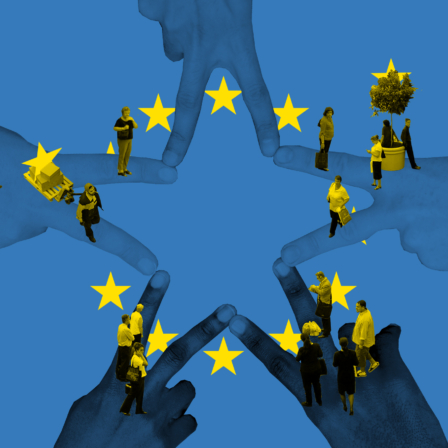






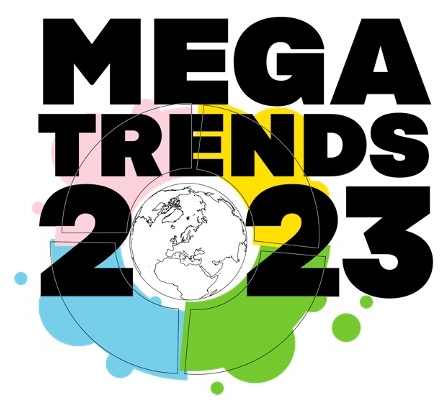
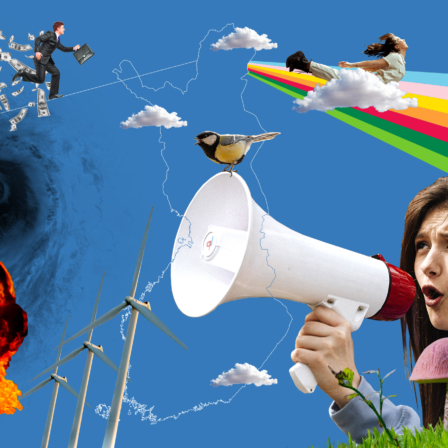
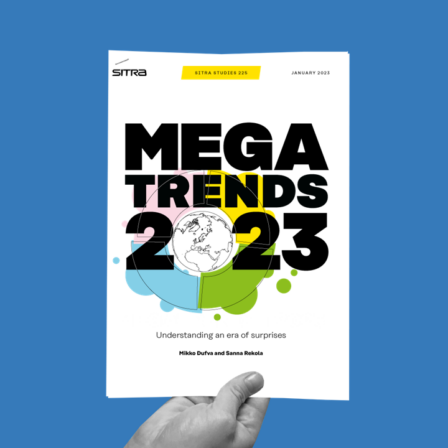

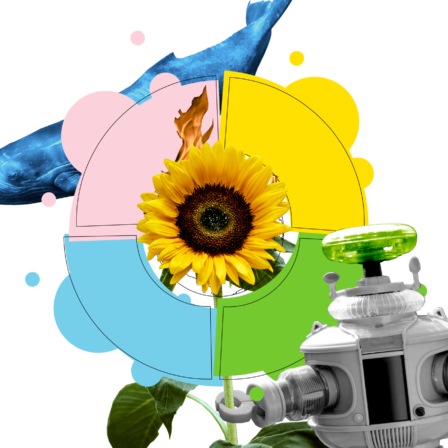
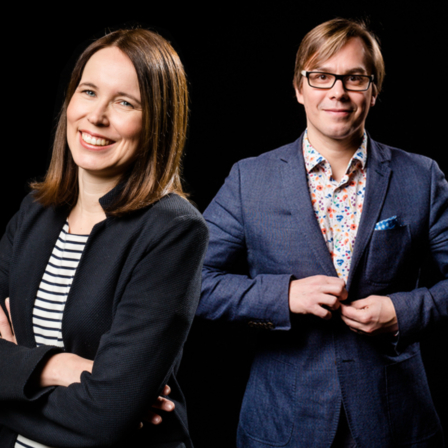
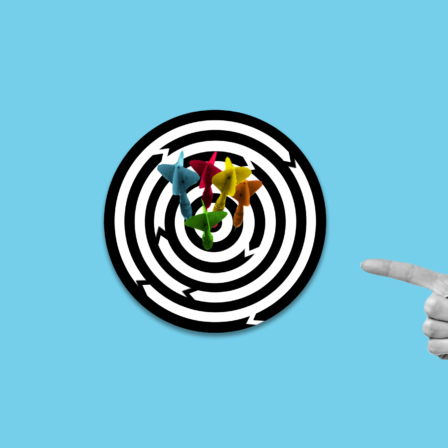

Recommended
Have some more.